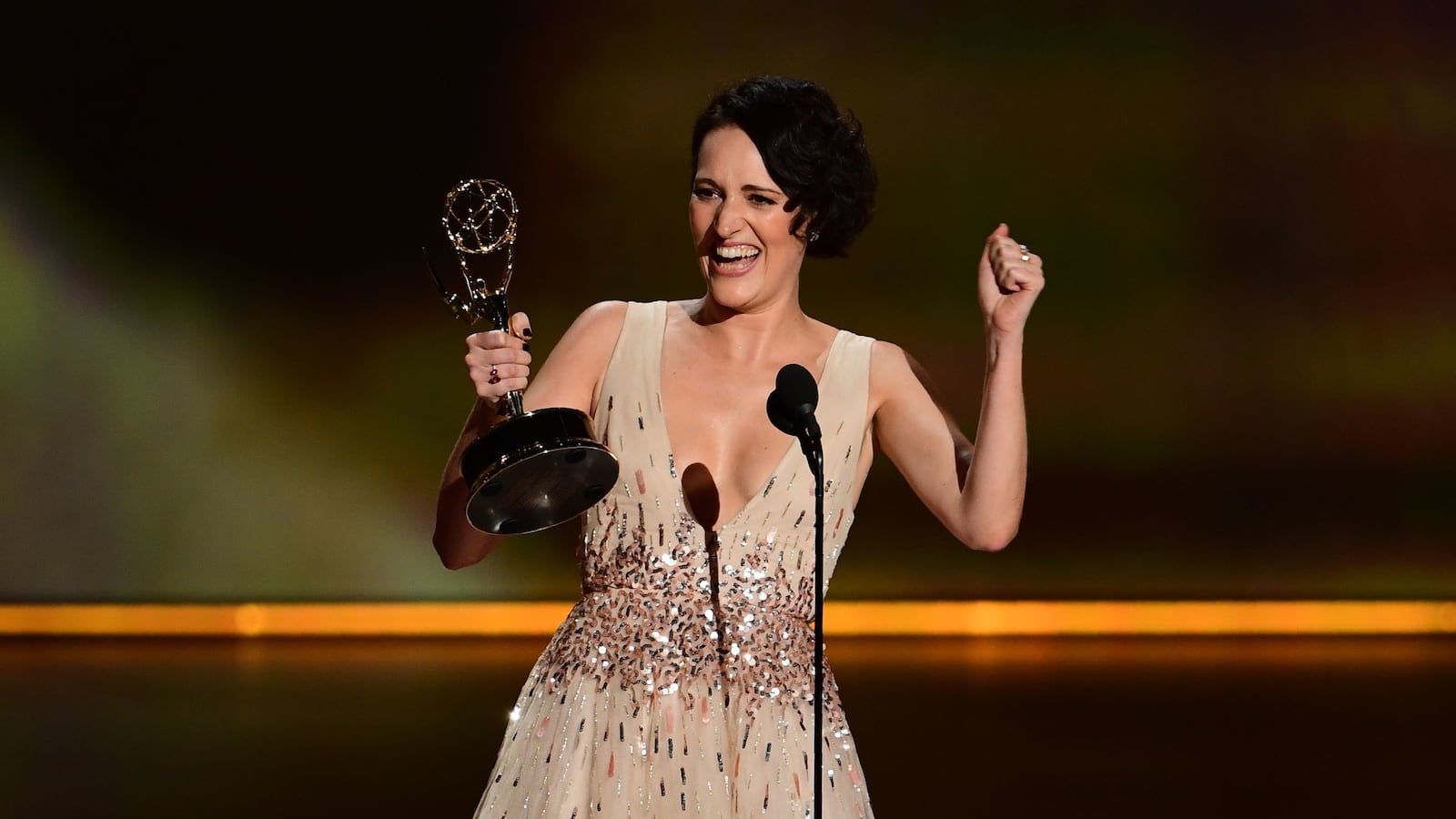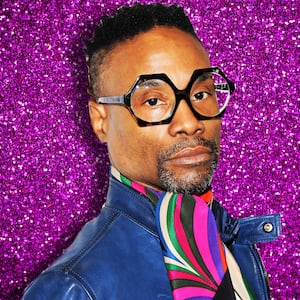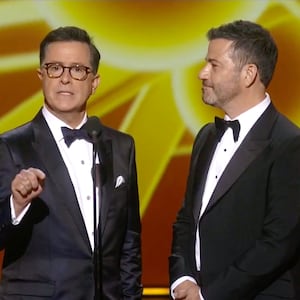Is television actually... bad? `
As a telecast meant to represent the finest the medium has to offer, Sunday night’s Emmy Awards could not have failed harder. It was almost shocking, really, the extreme dissonance between the quality of the shows, creatives, and performers rewarded—Fleabag! Billy Porter! Jodie Comer!—and the award show that was produced to celebrate them.
No wonder people seemed to have stopped caring about these things, as ratings freefalls suggest. This year’s host-free, focus-free, fun-free telecast seemed to not care even about itself. Fox produced one of the most phoned-in awards ceremonies I can remember watching in years.
It’s shameful, really, considering how refreshingly deserving many of the winners were and, from an entertainment-value standpoint, how beautiful and impactful the speeches they gave were, too.
You have Phoebe Waller-Bridge’s sweep for Fleabag, a show so unlike something the Emmys would normally reward it seems to have misunderstood what it is about entirely, referring to it as “a show about a sex addict” in presenter banter. (It is so many wonderful things. It is not that.) Thank goodness voters knew better and rose above such denigration.
You have Michelle Williams, winning for her work on Fosse/Verdon, using her platform to champion equal pay for women and extend her megaphone to women of color. Patricia Arquette, winning for The Act, mourned the loss of her sister, Alexis Arquette, and preached support for the trans community. Alex Borstein, accepting for The Marvelous Mrs. Maisel, told a moving story about the generations of strong-willed women in her family and what came of their bravery, ending with a rally cry: “Step out of line, ladies. Step out of line.”
Billy Porter became the first openly gay black man to win Best Actor, for his work in the groundbreaking FX series Pose, and rose to the historic occasion with his words, heralding that “the category is love, y’all, love” and quoting James Baldwin: “It took many years of vomiting up all the filth I had been taught about myself... before I could walk around this earth like I have the right to be here." (And credit presenter Kerry Washington for having the wisdom and savvy to build up the moment’s meaning with the bombast it deserved.)
There are the kind of lovely wins that delight cynical TV critics conditioned to expect such things, like for Killing Eve’s Jodie Comer or A Very English Scandal’s Ben Whishaw or When They See Us’s Jharrel Jerome.
There is so much evidence that TV really is greater than it’s ever been, with the people who make it more cognizant than ever of its power and potential for real, tangible change. Then there is Sunday night’s Emmys telecast, fully embodied by this photo of Sarah Silverman pretending to be asleep during it.
You cover these award shows, so many of them, year after year, and you get a sense for which ones are put together with love and passion for the art that is being honored, respect for the viewers tuning in to join the celebration, and with an eye toward nailing the delicate balance between prestige and entertainment that nobody can really articulate, but knows when they see it. Then there’s outings like this phoned-in mouth-fart of a telecast.
Like everything about the show, the decision to not have a host proved to be a lazy one, as the only discernible comedy bits delivered throughout the night were about the quandary of that very decision.
Not one of those bits landed, by the way. Not Ben Stiller’s bizarre tour of Madame Tussauds. Not Anthony Anderson’s manic opening. Not, bless their hearts for trying, Maya Rudolph and Ike Barinholtz’s Lasik eye surgery bit. (Though “Mickey Two Times” legitimately earned a chuckle.) Not Adam Devine singing an entire production number halfway through the show defining what a variety show is.
And, judging from Twitter, neither did Thomas Lennon’s color commentary as winners walked to the stage. Though I at least appreciated the effort that seemed to go into it, even Lennon himself resigned to the whole endeavor being a fool’s errand. “This is why people don’t do this, because it sucks,” he said halfway through the ceremony, cutting to commercial break.
When you’re pivoting from that to Viola Davis sternly crossing the stage delivering a monologue about what drama means as modern dancers pantomime behind her, it makes a wayward, directionless show all the more disinteresting and listless.
Teetering wildly between snarky ambivalence and startling earnestness—Bryan Cranston was nearly done with his opening speech before it became clear that it was not satire—is disorienting at face value, but especially without a host. You need someone to bring some sort of identity, cohesion, and, most importantly, tone—to make you feel like you’re being steered toward an actual destination, that things are moving, that someone is in control. Frankly, so that you’re not bored.
Even the telecast’s big bets on extreme reverence read absurd in the grand scheme of the show. The casts of Game of Thrones and Veep came out for final bows. But cherry-picking them and not, say, The Big Bang Theory, the most-watched show in the actual world, was peculiar. As was a montage of other shows that aired final episodes this year, which failed to include Emmy-winners like Orange Is the New Black—a series that actually changed television as we know it and, more specifically, as we watch it today—or Crazy Ex-Girlfriend, which, truthfully, I just like.
There have never been more TV shows—no, not by a long shot. (Over 500 and counting.) There have never been this many good TV shows, this much good acting, this much provocative and creative writing, this much inclusive storytelling, this many major movie stars on the small screen, or this much money being invested in television production.
By all those metrics, the select few series and performances selected as Emmy winners—the cream of the crop—should matter more than ever. But there was something about this year’s lackadaisical ceremony that, as deserved as they were, rendered who actually won somewhat meaningless.

Pose actor Billy Porter made history becoming the first openly-gay black man to win Best Actor at the Emmys
Robyn Beck/AFP/GettyThe show ran at a tight clip, ending just in time for the 11 o’clock news, and without obnoxiously playing off any of the winners. But at what cost? For whatever time that was cut by not having a host, the show felt like it dragged as long as it does any other year. And any time Fox seemed to recognize the significance of the platform it did have, it zapped itself of its own gravity, beginning with a fashion show of The Masked Singer costumes on the Emmys red carpet in the final countdown to the telecast’s start.
Sure, Game of Thrones got its big Best Drama win as a send-off. But by the time the show creators were saying their thank-yous, it seemed like everyone had already checked out of the show. And it’s my suspicion that TV fans, as far as the Emmys go, had already long moved on.
Think about it. Big Little Lies: Meryl’s Teeth, Stranger Things 3, and the current season of The Handmaid’s Tale will all be eligible next year, despite airing what seems like eons before Sunday night’s telecast. Hell, an entire new season of Pose has aired in the time since its last season scored its groundbreaking nominations. And does the Game of Thrones finale not seem like a lifetime and infinity news cycles ago?
In an amnesiac culture, that there’s so much TV to reward and the relentless pace at which it comes out may actually hinder the significance of something like the Emmys. We only care what we’re talking about now. At this moment, that means the Unbelievable miniseries on Netflix with Toni Collette and Merritt Wever, the new cycle of The Great British Baking Show, and the season of Succession that is actually good—not to be confused with the labored, mediocre season one that took home Best Writing on Sunday night.
It’s arguably a fantastic thing that there are so many TV options—so many good ones—and so many series and performances that people feel passionate about. That also means it’s easier than ever to dismiss a traditional, monolithic voting body that ignores your favorite show or actor. No Emmy for Catherine O’Hara? The Emmys are canceled!!!
Reading the news and certainly reading the number of zeroes on the checks being written, it frankly seems that the TV series that mattered most in 2019 are The Office, Friends, and Seinfeld. Watching Sunday’s show, it didn’t seem like current TV mattered much to the Emmys either.



